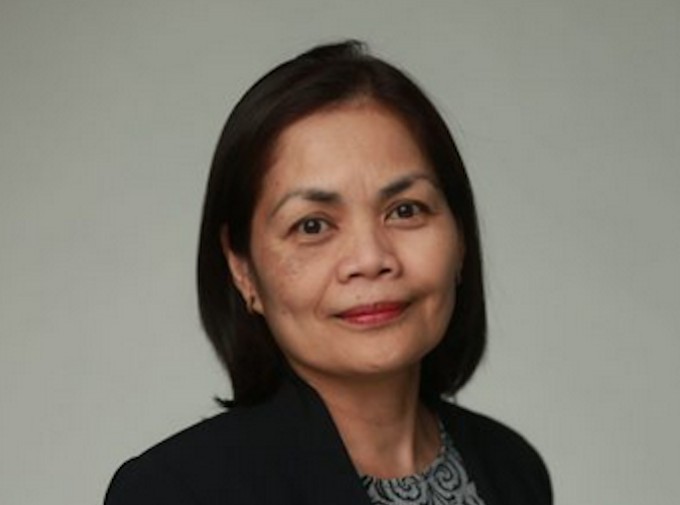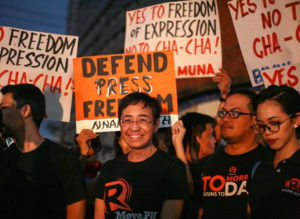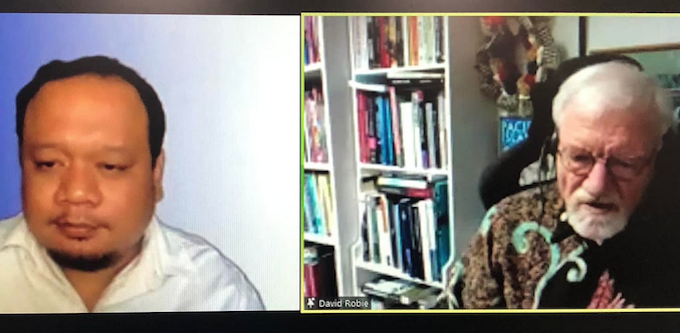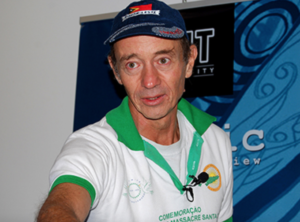
By Sri Krishnamurthi for Asia-Pacific Report
Keynote speakers professor David Robie and Glenda Gloria, executive editor of Rappler, addressed “truth and justice” on the opening day of the Asian Media Congress for Media and Communication (ACMC) conference in Auckland.
Dr Robie opened the conference yesterday with his topic “Journalism education ‘truth ’ challenges in an age of growing hate, intolerance and disinformation” while Gloria spoke about the difficulties of doing investigative journalism amid this covid-19 pandemic.
Founding director of the Pacific Media Centre, Dr Robie began with a tribute “to two extraordinary and inspirational journalists, who have shed light on dark places and given the rest of us hope”.
The first of these was to Maria Ressa, chief executive of the Filipino investigative website Rappler, who, along with Russian editor Dimitry Muratov, was named a Nobel Peace prize laureate last month for safeguarding “freedom of expression”.
The Norwegian Nobel Committee described them as “representatives of all journalists who stand up for this ideal in a world in which democracy and freedom of the press face increasingly adverse conditions”.
Julie Posetti, global director of research at the International Centre for Journalists (ICJ), said the choice had been very timely and she pointed to the fact that it had been 85 years since the first working journalist had won the Nobel prize.
German investigative editor Carl von Ossietsky won the Nobel prize for his “burning love for freedom and expression”’
Award in jail
Ossietsky, was incarcerated in a Nazi concentration camp at the time he won the award and later died in jail.
As Gloria told the conference hosted at Auckland University of Technology, the Nobel prize put a “global spotlight on the extraordinary dangers that we journalists face today”.
“You and I are no stranger to threats to media freedom – from repressive laws to libel suits to imprisonment to death threats,” she said.

“To many of us in the Global South, journalism has always been considered a dangerous profession long before media watchdogs started ranking countries around the world according to the freedoms enjoyed by their press.
“And yet, despite all that we have seen and experienced, it’s no exaggeration to say that this is the most challenging period for journalism. At stake today is our very existence, our relevance, and our ability to speak truth to power.
“Not only are journalists under attack. Truth is under attack,” Gloria said.
Optimism for Rappler
She gave three reasons for the Filipino publication Rappler to be optimistic in spite of dealing with 11 lawsuits aimed at silencing the website.
“Every crisis is an opportunity. In the last two years, we at Rappler managed to bounce back and continue holding power to account and exposing wrongdoing,” she said.
“Part of the reason is how our ownership structure was set up. Rappler is the only journalist-owned and journalist-led media company in the Philippines. We make decisions for the public interest even if it’s bad for business.
“Second reason to be hopeful is — for journalism to matter, the community must be a part of it. In our crisis years, our community stayed with us.
“We realised that we had a core base of audience that, while not massive, shared the same value that we believe in, which is the public’s need for transparency and accountability on the part of those who lead and government them.
“At Rappler, we learned that when the going gets tough, hold the line, stick to your core, and have faith in your community of readers.
“The third reason to be hopeful is that crisis challenges our mindsets. The attacks on Rappler scared away advertisers but also compelled us to diversify our revenue stream so that today, our revenues come not just from advertising but business research, grants, membership, programmatic ads, and special projects.
Postive net income
“We have not paywalled our site but we have content and activities exclusive to paying subscribers. Thankfully, we are now entering our third year of positive net income,” Gloria said.

Dr Robie’s second tribute was to Max Stahl whom he described as a “courageous journalist and filmmaker who sadly died at the age of 66 from cancer”.
From Timor-Leste, he made the controversial film footage of the 1991 Santa Cruz massacre in the capital Dili which eventually led to Timorese independence.

British-born Stahl returned to East Timor in 1999 and made the documentary In Cold Blood: Massacre of East Timor, for which he was decorated with the Order of Timor-Leste, the country’s highest honour and he was awarded Timor-Leste citizenship in 2019.
“The common thread linking all four of these media communicators – Maria Ressa, Dimitry Muratov, Carl von Ossietsky and Max Stahl – has been their courageous, determined relentless pursuit of ‘truth and justice’,” Dr Robie told the virtual conference.
“ ‘The truth’ – this supreme goal of journalists in holding power to account is hugely under threat by politicians, demagogues and charlatans peddling fake news and disinformation,” he said.
Dr Robie spoke about covid-19 and the “disinfodemic” – described by UNESCO as “falsehoods fuelling the pandemic”, leading to civil disobedience and attacks on medical staff the world over, including in Aotearoa New Zealand.
Violence pervaded South Pacific
The violence had pervaded the South Pacific and was noticeable in Fiji and Papua New Guinea despite the high number of people being infected.
Dr Robie highlighted PNG where health authorities were forced to cancel vaccinations for fear of attacks, hence the rate is incredibly low this month, sitting at 2.5 percent,
He also addressed the infodemic and the rise of “disinformation” and the challenges it brought to the media.
Dr Robie spoke about climate change “and the disproportionate impact this is having on our Asia-Pacific region”.
A key component of the disinfodemic was the lack of fact-checking and as veteran Pacific journalist and consultant Bob Howarth had asked, why had the basics of fact-checking not “become part of journalism training in our universities and colleges?”.
Dr Robie also spoke about climate change “and the disproportionate impact this is having on our Asia-Pacific region”.
Climate ‘catastrophe’
He outlined the challenges of climate change, preferring to call it climate “catastrophe”.
“I am stressing the word catastrophe rather than merely change, That is because for the microstates of the Pacific it is already viewed as an impending catastrophe,” he told the conference.
Dr Robie said he had developed several theories and models of journalism such as “talanoa journalism”, a concept developed through a Pacific approach.
“My emphasis has been on ‘project journalism’, creating high quality coverage of issues and challenging assignments on university platforms with high standards of journalistic integrity and to foster multi-university collaboration across national boundaries.”
The conference concludes tomorrow.













































